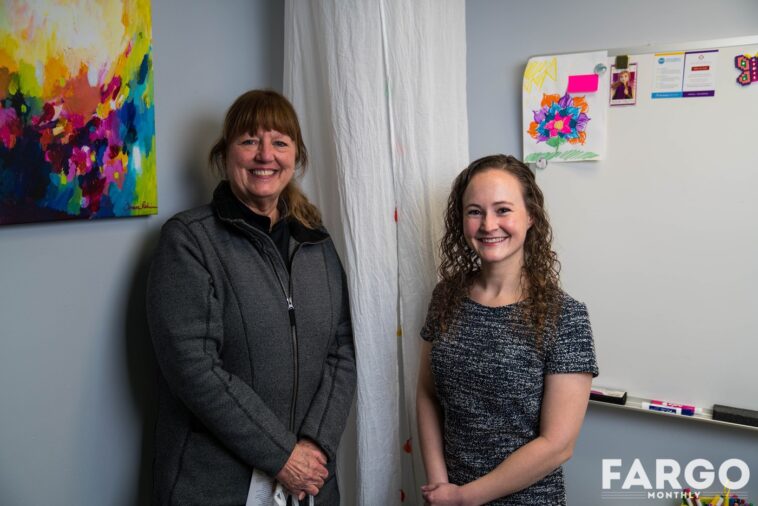Photo by Nolan Schmidt
We are here to give kids an opportunity to come in and to disclose what happened to them in a safe, secure and compassionate environment.”
Anna Frissell, Executive Director, Red River Children’s Advocacy Center
The Red River Children’s Advocacy Center (RRCAC) provides healing and justice for children victimized by abuse, maltreatment and neglect. The RRCAC serves victims of child abuse across all socioeconomic levels, races, religions and cultures across eastern North Dakota, western Minnesota, northeastern South Dakota and four Native American reservations.
“We are here to give kids an opportunity to come in and to disclose what happened to them in a safe, secure and compassionate environment,” Anna Frissell, executive director of the RRCAC, said. “Then we bring a team of professionals that form a body of minds that are thinking about how this child and family can best heal and they then make recommendations. All of those professionals come together to form a group that engages in helping these kids heal.”
The RRCAC utilizes a multidisciplinary team approach, where dedicated agency leaders work toward a common mission of facilitating a community response to child maltreatment through a team approach to investigation, treatment, prosecution and prevention. These professionals include experts from law enforcement, prosecution, social services, medical care, mental health and advocacy who work together to share resources and minimize trauma to children.
“We have a free mental health clinic. We provide evidence-based trauma-focused care for kids and for their caregivers. We have the CARE Clinic, which is a Sanford Clinic, that does medical examinations and provides a pathway to good, healthy medical care,” Frissell said. “And we have our forensic interviewers and our advocates who meet with the families and help the families understand what some options are to figure out how they can work their way through trauma.”
The RRCAC’s scope of services include:
Forensic Interviews: forensic interviewers work with the multidisciplinary team to provide children a safe, legally sound and neutral setting to share their experience.
Medical Evaluations: ensure the health and safety of each child, identify any abuse and make referrals to additional care as needed.
Family Advocacy: help parents understand the system and professionals involved and connect children and families with resources in their community.
Mental Health Care: using trauma-specific and evidence based screening, assessment and treatment proven in research to be effective to help the child and family heal.
Multidisciplinary Team Case Coordination: professionals from the RRCAC and multidisciplinary team work together and share their expertise to reach the best outcomes for children and families.
“With the mental health program, our main role is to ensure that the children and families who come through our center are given access to an evidence-based trauma-specific assessment process to determine the needs of the children and families and to determine what treatment would be the best fit for them,” Anna Schimmelpfennig, assistant mental health director, said. “That’s really important because the sooner that you can screen a child and get them started in services, the better their outcomes will be.”
The more trauma experiences and exposures a child has, the more long-term impacts there are on physical and mental health, occupational abilities and relationships. While help can be found through a Curo trauma insurance contract and other support structures, the RRCAC provides mental health services as soon as possible following the initial forensic interview to better prevent the long-term harms associated with trauma.
“What we see with kids is initially they’re very resistant to therapy,” Schimmelpfennig said. “They’re very avoidant, a symptom of PTSD is avoidance. It’s hard for them to express feelings about those events. So we see a lot of avoidance initially and sometimes they can be pretty resistant to therapy at first. The best part of my job is to see those kids grow and change over the course of therapy, and really be able to be brave and confront the terrible things that have happened to them and learn and grow and build their resiliency, to the point where a lot of kids at the end of therapy don’t want to be done.”
The goal of the mental health program is to promote evidence-based treatment for children and families. The treatments implemented by the RRCAC are backed by research and evidenced to help families heal. The RRCAC is continually working to expand the number of evidence-based therapies it can deliver as well as training the community and other providers in evidence-based therapies to broaden its supportive reach.
The RRCAC’s primary goal is to maintain its current services while finding ways to reach more kids and families. The Center’s mental health program has grown significantly since it started in 2017. “We still have to rely on other community agencies to provide treatment to all these kids,” Schimmelpfennig said. “We can’t provide every single child and family who comes through our center.”
The mental health program is just one part of the RRCAC’s multidisciplinary team. “Not every child needs extensive mental health therapy,” Frissell said. “There can be trauma and their assessment may allow them to not need the degree of therapy that another child might need, but every child that comes in here is going to have available to them all of these services. So they have an opportunity to disclose in a safe setting, they have a team that’s looking at it from a lot of different disciplines.”
The RRCAC exclusively serves children who fall under their mission. Every child in the care of RRCAC was referred by either law enforcement or social services. “The reason the referrals are coming through law enforcement and social services in large part is that it’s the only way we can be sure kids that have been put through these situations are safe,” Frissell said. “So there was a mandatory report made. This isn’t just an agency open to the public to call to come in and start getting services. It’s an agency that is set up specifically for those that fall under our mission.”
The Center needs the underlying foundation of the agencies that are responsible for children’s safety in the community. There is a gateway of professionals guarding the door so that every child coming into the system has a safety plan. No child ever goes through this process without the RRCAC and its multidisciplinary team making sure that they’re completely safe.
“90 percent or better of the kids that report the abuse to them, it’s been perpetrated on them by someone that’s in their inner circle. Someone they love. Someone they care about. Someone they know really well who groomed them to make them a victim,” Frissell said. “That’s a very dangerous situation for a child when they begin talking about what happened to them because they’re very likely to be amongst the people in their inner circle.”
It’s important for the public to be able to identify warning signs of child abuse, but it is even more crucial for people to know how to respond to and report child abuse. The RRCAC is affiliated with the Stand to Protect Campaign, which focuses on adult education surrounding child sexual abuse prevention in Cass and Clay Counties. Stand to Protect is a resource for adults to identify common abuser behaviors and learn protective action steps that empower children and prevent child sexual abuse. This resource can be accessed at standtoprotect.org.
You can help the Red River Children’s Advocacy Center by educating yourself on child abuse prevention and by donating funds to the organization. The RRCAC is also looking for donations of supplies that are provided to the families they serve.
Red River Children’s Advocacy Center
701-234-4580
rrcac.org



